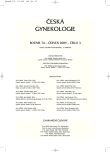-
Medical journals
- Career
Knowledge of Czech and Romanian women about STIs. Representative survey
Authors: J. Justinová 1; P. Weiss 2; V. Unzeitig 3; D. Cibula 4
Authors‘ workplace: 1. LF UK, Praha, děkan prof. MUDr. T. Zima, DrSc. 1; Sexuologický ústav 1. LF UK a VFN, Praha, přednosta doc. MUDr. J. Zvěřina, CSc. 2; Gynekologicko-porodnická klinika LF MU, Brno, přednosta prof. MUDr. P. Ventruba, DrSc. 4Gynekologicko-porodnická klinika 1. LF UK a VFN, Praha, přednosta prof. MUDr. A. Martan, DrSc. 3
Published in: Ceska Gynekol 2009; 74(3): 240-245
Overview
Objective:
Survey of knowledge of Czech and Romanian women about STIs and their perception of sources of the informationDesign:
Representative survey.Methods:
Anonymous questionnare survey of the sample of 1011 Czech and 1001 Romanian women aged 15 to 50.Results:
The doctor or the psychologist is considered to be the most reliable source of information about STIs, the Czech women prefer information from books and papers, Romanian women consider the close persons to be more better source of information than Czech women. The Czech women know better the realy effective methods of STI prevention and situations which are risky from the possible HIV/AIDS infection, Romanian ones more often believe in non effective methods of prevention and more often are affraid of situations, which are not dangerous and more often were not able to answer the questions at all.Conclusion:
Romanian women have worse konwledge in the area of STIs than Czech ones. They are also more credulous to information from different sources, especially to those provided by experts or by close persons.Key words:
STIs, HIV/AIDS, information, knowledge.
Sources
1. Allen, L. „Say everything“: exploring young people’s suggestions for improving sexuality education. Sex Education, 2005, 5, 4, p. 389-404.
2. Anderson-Ellström, A., Forssman, L., Milsom, I. The relationship between knowledge about sexually transmitted diseases and actual sexual behaviour in a group of teenager girls. Genitourinary Med, 1996, 72, p. 32-36.
3. Anderson-Ellström, A., Milsom, I. Knowledge about the prevention of sexually transmitted diseases: a longitudinal study of young women from 16-23 years of age. Sex Transmitted Infect, 78, 2002, p. 339-341.
4. Centrální informační systém pro infekční choroby (CISID) Světové zdravotnické organizace. http://data.euro.who.int/cisid, 13.12.2008.
5. Gordon, LE., Ellingson, L. In the eyes of the beholder: Student interpretations of sexuality lessons. Sex Education, 2006, 6, 3, p. 215-264.
6. Kirby, DB., Laris, BA., Rolleri, LA. Sex and HIV education programs: Their impact on sexual behaviors of young people throughout the world. J Adolesc Health, 2007, 40, 3, p.206-217.
7. Kuklová, I. Prevence sexuálně přenosných infekcí. Moderní babictví, 2006, 11.
8. Morrison-Beedy, D., Nelson, LE. HIV prevention interventions in adolescent girls: What is the state of the science? Worldviews on Evidence-Based Nursing, 2004, 1, 3, p.165-175.
9. Selak, S., et al.What do young people from Mostar, Bosna and Herzegovina, know about contraception and sexual health? Croatian Med J, 2004, 45, p.44-49.
10. Svenson, GR. a kol. Doporučení Evropské unie pro peer výchovu v prevenci HIV/AIDS. Evropská komise, 1998.
11. Thomas, JC., et al. Trust and collaboration in the prevention of sexually transmitted diseases. Public Health Reports, 2001, 116, p. 540-547.
12. Weinhardt, LS., Mosack, KE., Swain, GR. Development of a computer-based risk-reduction counselling intervention: Acceptability and preferences among low-income patients at an Urban Sexually Transmitted Infection Clinic. AIDS and Behavior, 2007, 11, 4, p.549-556.
13. Weiss, P., Zvěřina, J. Sexuální chování obyvatel České republiky a pražské mládeže s ohledem na riziko HIV/AIDS. Demografie, 37, 1995, p. 215-219.
14. Weiss, P., Zvěřina, J. Vzdělání a rizikovost sexuálního chování u obyvatel České republiky. Čes Slov psychiat, 1998, 94, 3, 1998, s. 150-156.
Labels
Paediatric gynaecology Gynaecology and obstetrics Reproduction medicine
Article was published inCzech Gynaecology

2009 Issue 3-
All articles in this issue
- Proteomics and biomarkers for detection of ovarian cancer
- Paraneoplastic syndromes in oncogynecology
- New diagnostic approach to different hydatidiform mole types, hydropic abortions and relevant clinical management
- Current options of prenatal diagnosis in congential diaphragmatic hernia
- IgG antibodies against laminin-1 in serum and in peritoneal fluid in patients with decreased fertility
- Disorders of sex differentiation: genes responsible for development of genital system and final phenotype
- Common variable immunodeficiency (Set of case reports)
- Isolation and immunology identification of spermagglutinating antibodies from human serum
- Contraceptive methods used by women in the period before and after giving birth
- Corelation between hyperviscosity of the ejaculate and physical-morphological and biochemical parameters
- Comparison of prenatal ultrasound examination, post-mortem magnetic resonance imaging and autopsy (a case report – schizencephaly)
- Unwanted children
- Uterine torsion – the rare compliation of pregnancy
- Rectal duplication cyst – case report
- Knowledge of Czech and Romanian women about STIs. Representative survey
- Czech Gynaecology
- Journal archive
- Current issue
- Online only
- About the journal
Most read in this issue- Unwanted children
- Uterine torsion – the rare compliation of pregnancy
- New diagnostic approach to different hydatidiform mole types, hydropic abortions and relevant clinical management
- Paraneoplastic syndromes in oncogynecology
Login#ADS_BOTTOM_SCRIPTS#Forgotten passwordEnter the email address that you registered with. We will send you instructions on how to set a new password.
- Career

